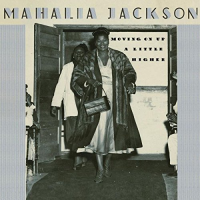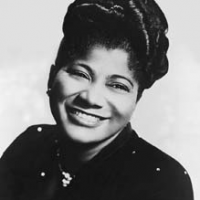Home » Jazz Musicians » Mahalia Jackson
Mahalia Jackson
Mahalia Jackson rose from Deep South poverty to world renown as a passionate gospel singer. Closely associated with the black civil rights movement, Miss Jackson was chosen to sing at the Rev. Dr. Martin Luther King Jr.'s March on Washington rally at the Lincoln Memorial in 1963. "I been 'buked and I been scorned/ I'm gonna tell my Lord/ When I get home/ Just how long you've been treating me wrong," she sang in a full, rich contralto to the throng of 200,000 people as a preface to Dr. King's "I've got a dream" speech. That was truly a historic occasion.
The song, which Dr. King had requested, came as much from Miss Jackson's heart as from her vocal cords. The granddaughter of a slave, she had struggled for years for fulfillment and for unprejudiced recognition of her talent. Although Miss Jackson's medium was the sacred song drawn from the Bible or inspired by it, the words-and the "soul" style in which they were delivered-became metaphors of black protest. Among her own people her favorites were "Move On Up a Little Higher," "Just Over the Hill" and "How I Got Over."
Singing these and other songs to black audiences, Miss Jackson was a woman on fire, whose combs flew out of her hair as she performed. She moved her listeners to dancing, to shouting, to ecstasy.
Many of Miss Jackson's songs were evocations of religious faith and were intended, in keeping with her own profound belief in God, to be devotional. Her rhythms might be syncopated, but her soaring voice aimed to obey the psalmist's injunction to "make a joyful noise unto the Lord."
Miss Jackson's songs were not hymns, nor were they jazz. Convinced that everything she said or did rested on the word of God, she resisted efforts of the late Louis Armstrong and other jazz or blues musicians to transform her into a jazz singer.
Seeking to communicate her faith, Miss Jackson did a great deal of her singing, especially in the early days, in store- front churches, revival tents and ballrooms. A massive, stately, even majestic, woman, she possessed an awesome presence that was apparent in whatever milieu she chose to perform.
Whether singing at the inauguration of President John F. Kennedy or at Constitution Hall in Washington, or at Philharmonic Hall here, or in prisons, hospitals and children's homes, Miss Jackson always commanded respect. But she never forgot her origins. Born in New Orleans on Oct. 26, 1911, she was the third of six children of a man who was a longshoreman by day, a barber by night and a clergyman on Sunday. Her home, left motherless when she was 6, was impoverished but respectable.
Read moreTags
Fire Music: When Jazz Speaks Out - Part 1

by Ludovico Granvassu
Music often distills the truth in ways that make it hard to ignore. The history of jazz is intertwined with the struggle for the advancement of the African-American society that birthed it. Many of its masterpieces were inspired by events that marked the civil rights movement, which, in turn, drew inspiration from them. Let's look back at the amazing body of music that has come out of the African-American struggle for social justice and equal rights, through the works of ...
Continue ReadingJazz and the Dream of Martin Luther King, Jr.

by Douglas Groothuis
Without jazz, there may have been no “I Have a Dream" speech by Martin Luther King Jr. Delivered at the August 28, 1963 March on Washington for Jobs and Freedom, this historic oratory is most known for improvisation--a skill without which there is no jazz--that was not found in his original written text. Moreover, the very spirit of the civil rights movement owes much to jazz, as Dr. King himself said, as we will find. Mahalia Jackson was ...
Continue ReadingNothing but Love in God's Water by Robert Darden

by C. Michael Bailey
Nothing but Love in God's Water--Volume 1: Black Sacred Music from the Civil War to the Civil Rights Movement Robert Darden 224 Pages ISBN: # 978-0271050843 Penn State Press 2014 Critic Ed Ward's The History of Rock & Roll, Volume 1: 1920-1965 (Flatiron Books, 2016) is a history written with a very even and broad horizon in mind. Bigger than the blues, country, and soul: rock & roll is an internationally large ...
Continue ReadingCelebrate Valentine’s Day With A Free Concert Featuring The Music Of Two Iconic American Singers: Chris Connor And Mahalia Jackson

Source:
Braithwaite & Katz Communications
New England Conservatory’s Contemporary Musical Arts Department pays tribute to two of the most iconic and creative American singers of the 20th century in Night and Day: The Music of Chris Connor and Mahalia Jackson on Wednesday, February 14, 7:30 p.m. at Jordan Hall, 290 Huntington Avenue, Boston. The program is curated by faculty members Hankus Netsky and Ran Blake. Admission is free, but tickets are required. For information visit https://necmusic.edu. The title of this Valentine’s Day concert, Night and ...
read more
Mahalia Jackson: A Little Higher

Source:
JazzWax by Marc Myers
In the 1950s, R&B and rock 'n' roll was aimed squarely at the bottom half of the body while gospel took care of the rest. Blues shouting came out of gospel in the 1940s. So did the passion and conviction of jazz solos and jazz vocals. In the world of gospel singing in the 1940s and '50s, the Queen of Pews was Mahalia Jackson. Born in New Orleans in 1911, Jackson single-highhandedly turned church singing into a high art, lifting ...
read more
Magda Piskorczyk - 100th Birthday Celebration of Mahalia Jackson

Source:
Magda Piskorczyk
Magda Piskorczyk in Honor of Mahalia Jackson for the 100th Birthday Anniversary of the Queen of Gospel Magda Piskorczyk has prepared a new concert program on the occasion of the one hundredth anniversary of Mahalia Jackson's birthday on October 26, 2011. It contains Magda's interpretations of the songs performed by the Queen of Gospel. “Come on Children, Let's Sing," “Lord, Search My Heart," “I'm Goin' to Live the Life I Sing About in My Song," “Keep Your Hand on the ...
read more
Musical on Gospel Star Mahalia Jackson at Cambridge Multicultural Arts Center, February 4-20

Source:
MassJazz: Jazz in Massachusetts
An inspiring musical play on the life of gospel singer Mahalia Jackson opens at the Cambridge Multicultural Arts Center on Friday, February 4 and runs through Sunday, February 20, 2011. The performances, presented by Mixed Magic Theatre, take place Fridays and Saturdays at 8:00 p.m. and Sundays at 4:00 p.m. Tickets to the show are $15-25 and can be ordered online. Group discounts for 15 or more are also available by contacting the Box Office. Described by Little Richard as ...
read more
Jazz Unites, Inc To Leadoff Black History Month Celebrations With Annual Tribute to Marian Anderson & Mahalia Jackson

Source:
All About Jazz
Jazz Unites, Inc. presents The 21st Annual Historical/Musical Tribute to Marian Anderson and Mahalia Jackson. This award-winning event returns to the acoustically superior Harris Theater with an exciting musical mix of gospel, classical and jazz artists---including soprano Jonita Lattimore, gospel artist Roberta Thomas, and Broadway performer Aisha de Haas, backed by pianist Thomas Jefferson and jazz bassist John Whitfield, with narration by WGN-TV personality Merri Dee. The Jazz Unites Benefit Reception follows the concert. Concert performers and other special guests ...
read more
Marian Anderson/Mahalia Jackson Tribute Concert

Source:
All About Jazz
Jazz Unites presents their annual celebration of two divas whose careers broke cultural barriers. Classical sopranos Jonita Lattimore and Rauquaia Hale-Wallace join gospel artists Felicia Coleman-Evans, Roberta Thomas and Tamara McCann, and jazz musicians Lee Koonce, Earma Thompson and John Whitfield, along with Broadway performers Aisha and Darius de Haas. At the Harris Theater for Music and Dance in Millenium Park, Chicago, on January 16, 2005, starting at 3:00 pm.
Concert-goers are invited to attend the benefit reception at the ...
read more
New England Conservatory Summer School Presents Mahalia Jackson's Music

Source:
All About Jazz
Ran Blake, Chair of Contemporary Improvisation/Third Stream Department, Leads Appreciation Class on Gospel Great
August 11 - 19 (five meetings) W,F,M,T,Th: 5:30-8:30 p.m.
Mahalia Jackson, an icon of gospel music, continues to inspire musicians the world over. Ran Blake, chair of the NEC Contemporary Improvisation/Third Stream Department, will explore Jackson's musical world -- her position within gospel music, her unique relationship with pianist Mildred Falls, and her exquisite vocal timbre. He will use selected recordings, articles, films, and conversations with ...
read more























